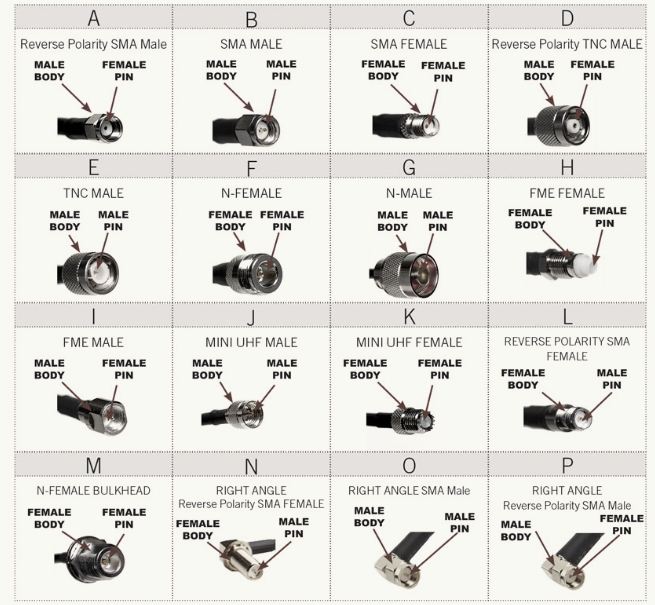Commonly used RF Connectors in Wireless Broadband Installations
Various standards for RF connectors have evolved across the wireless industry for different types of product and application. Some applications which use high power (for example, LTE base stations) require connectors capable of carrying high RF power levels, and low-PIM (phase intermodulation). Many applications are driven by motivation to smaller sizes and lower cost.
Almost all radio links use 50 ohm impedance-matched connectors and cables. Note that for outdoor installations, most connectors are not waterproofed – so external waterproofing is almost always required.
Reverse Polarity SMA (RP-SMA):
Popular and commonly used on:
- Indoor Wireless Access Points (WiFi AP)
- Outdoor Wireless Radio links
- LTE Indoor CPE devices
SMA connectors
Older, and now less commonly used on:
- Indoor radio units links
- Indoor WiFi Access Points (WiFi AP)
- LTE Small Cell and some Indoor CPE devices
TNC connectors
Less commonly used, but saves panel space compared to N connectors, hence used on some:
- Split-mount (IDU+ODU) Microwave link Indoor Units
N Connectors
Larger than most connectors, and commonly used on:
- Microwave Links – ODU (Outdoor Unit) and IDU (Indoor Unit)
- Radio Antennas (MIMO and SISO)
- LTE CPE antennas
F-Type Connectors
Extremely low cost connector, as the centre core of the cable is used as the central pin during installation. Generally used only in:
- Satellite TV installations
- Cable TV installations
MMCX
The MMCX connector is a small board-level connector, used inside equipment. typically the MMCX is used on shorter RF pigtails which connect from the board to external panel mount connectors. MMCX is physically more robust than U.FL and preferred by most users, though MMCX takes up more board space and slightly higher cost point than U.FL. Most commonly used in:
- Outdoor Radio Links
- Outdoor WiFi APs
U.FL/IPEX
The U.FL Connector is a board-level connector used on smaller RF boards inside equipment to RF pigtail cables. Extremely low cost, and compact, sometimes criticised for lack of robustness. Only rated for a few reconnects. Most commonly used in:
- Indoor WiFi AP
- LTE CPE devices
7/16 DIN Connector
The 7/16 DIN Connector can carry high RF power levels. Larger size, so takes up panel space. Used on:
- LTE Sector Antennas
4.3/10 Connector
Can carry high RF power levels. Smaller size then 7/16 DIN Connector. Used on:
- LTE Base Stations
- LTE Remote Radio head (RRH)
- LTE Sector Antennas
Pictures of most popular RF Connectors:

Weatherproofing RF connectors & Installations
Note that most RF connectors are not weatherproof by design. Installers are trained to use weatherproofing tape (self amalgamating tape) to create a weatherproof solution around connectors when installing wireless solutions outdoors. A key goal is preventing moisture ingress. If moisture enters an RF jumper cable or pigtail, it can travel along the dielectric structure of the cable, changing the impedance and resulting in heavily degraded, unreliable or failed wireless links. If this occurs, jumper cables generally have to be replaced.
For Further Information
Please Contact the CableFree team or your local Approved Partner
You must be logged in to post a comment.